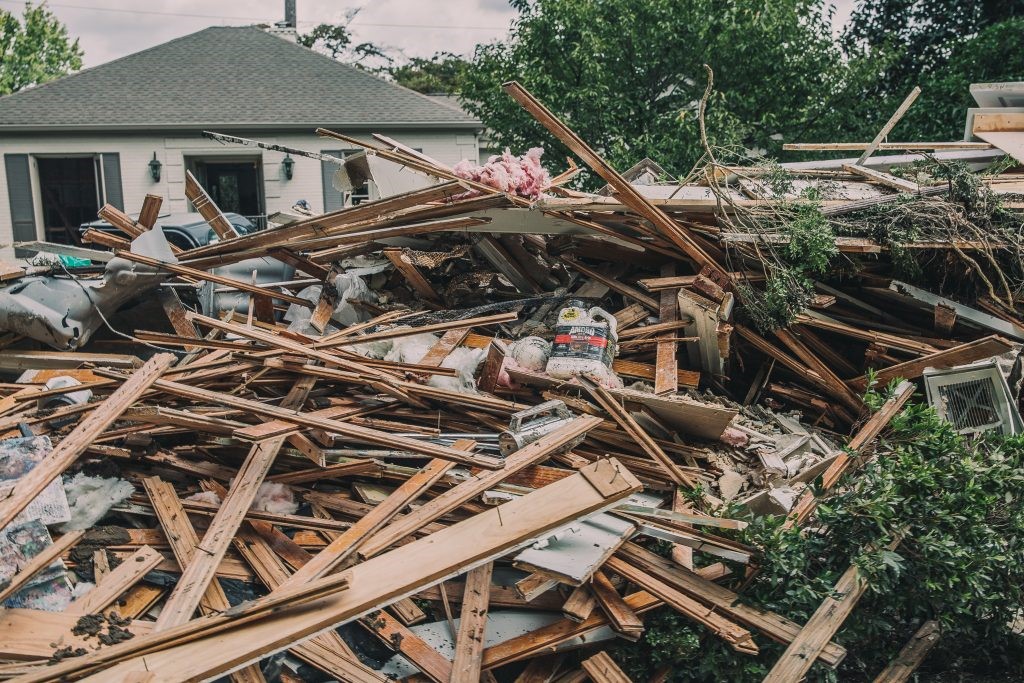Will devastating weather stall economic progress?
Irma, the deadly storm that began as a hurricane before it weakened into a tropical storm, cut a swath of devastation across the southeast this week, leaving in its wake heavy rainfall, lost lives and millions of dollars in damage.
The storm also caused ripples across financial markets, setting off concerns that the U.S. soon may find itself in the throes of a temporary economic slowdown. But as the storm lost power once moving further inland, investors regained confidence: stocks on insurers and travel companies rose, bond prices fell, yield on the 10-Year Treasury went up and home improvement company stock tumbled as investors anticipated fewer homeowners needing repairs from the storm.
Irma comes after the chaos wrought by Hurricane Harvey, which battered Texas and Louisiana with torrential rainfall and historic flooding in August. In a report from Goldman Sachs, researchers estimate that Hurricane Harvey caused about $85 billion in damage, making it one of the costliest natural disasters in post-war U.S. history, second only to Hurricane Katrina.

An economic lull
It's not unusual for economic activity to slow in the aftermath of hurricanes and other natural disasters, nor is it unusual for the rebounds after said disasters to be sharp. The Goldman Sachs report, which focuses mostly on Hurricane Harvey, suggests the storm's disruption will yield near-term slowdowns in several key economic indicators, including retail sales, housing starts and nonfarm payrolls (i.e., jobs).
Most of these metrics are expected to rebound, given time. One notable exception is the faint rebound in housing, which may reflect the lags typical of the rebuilding process. And although Congress last week approved spending $15 billion for hurricane relief, history has proven that federal emergency spending on construction tends to gradually increase over years, not months.
But it's not all bad news. Analysts expect a near-term boost in inflation thanks to higher gasoline prices and ramped-up spending to assist with rebuilding in the aftermath of Harvey and Irma. Goldman Sachs predicts a rebound the fourth quarter of the year is likely and will continue into the first half of 2018. A bump in business investment and construction activity may very well offset the negative impacts of the storms.
Still, we'll have to weigh the damage Irma's unleashed once those estimates come to bear. The economic fallout of two hurricanes hitting the U.S. back-to-back could be significant.

Purchase originations on the rise
Mortgage purchase originations rose to a 10-year high just as refinances fell to a 16-year low during this year's second quarter, according to the latest Mortgage Monitor report from Black Knight Financial Services. This comes at the same time mortgage applications jumped nearly 10 percent — the result of homeowners seeking to take advantage of historically low interest rates.
Despite the bump in purchase originations, the lending market continues to perform far below capacity. That's because stringent credit requirements in the aftermath of the financial crisis have prevented some would-be buyers from entering the market.
"Today, there are 65 percent fewer purchase loans being originated to borrowers with credit scores below 720 than in those years," said Ben Graboske, Black Knight's data and analytics executive vice president. "The lack of credit availability for those borrowers is causing a strong headwind for the purchase market."
Inflation takes a positive turn
This year's historically weak inflation may be on the mend, according to economic data released this week.
First, applications for new homes rebounded in August, growing nearly 7 percent and reversing a summerlong trend of falling new home sales, according to the Mortgage Bankers Association. Lower-than-expected interest rates and the rise in existing home prices continue to fuel the demand for new homes.
A key inflationary measure also saw a reversal of fortunes in August. U.S. producer prices went up in August 0.2 percent, on the heels of July's disappointing 0.1 percent fall. The producer price index details the average change in selling prices from the perspective of domestic producers. Although it rose in August, it was still below the expectations of analysts, who predicted the index would rise by 0.3 percent.

Also on the rise were U.S. consumer prices, which grew 0.4 percent last month after only edging up 0.1 percent in July, according to the Labor Department's Consumer Price Index.
The jump reflects the rising costs in gasoline and rent, and was the largest gain for the CPI in seven months. Economists expected the CPI to rise by 0.3 percent in August. It's possible the September CPI will increase, as well, underscoring the surge in gasoline prices after Hurricane Harvey forced the temporary closing of several refineries.
Retail sales took an unexpected tumble in August, falling 0.2 percent after going up 0.3 percent in July. The Commerce Department figures suggest Americans cut back on spending at the end of the summer, and points to the effects Hurricane Harvey had on motor vehicle purchases, which fell 1.6 percent last month.
These are important gauges for the Federal Reserve as the central bank presidents prepare to meet in New York next week. There, they'll be faced with deciding whether to raise the benchmark interest rate or delay the hike for another three months to monitor economic data for any sustainable strength and upward pressure on inflation.


